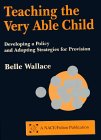|
Teacher Feature...
Both Sides Now in Gifted Education
by Sylvia Burke
I thought I was through with educational matters when I retired from teaching in 1997. I had taught for 27 years, 16 of them in a program for academically gifted children. I thought it was time for me to go fishing.
Shortly after I retired, I became active in the Connecticut Association for the Gifted, a statewide volunteer organization of parents and teachers. Most of our members are parents, and one of my jobs has been to answer questions from them on our hotline. It has made me reconsider the way we think about very bright children at home as compared to the way we think about them at school.
One of the most common hotline calls we get is from parents who have watched their eager pre-schooler, who once learned quickly and with enthusiasm, turn into an elementary or middle school student who is bored and not working up to potential.
I've never met a teacher who purposely went out of his/her way to bore students. Well, maybe one, and he was a genius at reverse psychology of a sort. But gifted kids are not easy to teach. Think about a few common characteristics of gifted kids:
- They like to participate, sometimes monopolizing the discussion.
- They like to ask questions, sometimes awkward questions.
- They don't like to be wrong, as a matter of fact they often want to be perfect.
- They know what they want to know, and often it isn't on today's agenda.
- They want to learn certain things in a depth greater than their age peers; they are sometimes difficult to move on to a different topic.
- They have a great storehouse of knowledge on some topics, sometimes greater than that of the teacher.
- They "get it" quickly and have no interest in or need for repetition or drill.
These are only a few of the common characteristics, but they are enough to establish a disconnect, because while the parents are focusing on the first part of each statement, teachers are grappling with the implications of the second part of each.
So, when a parent rightly says, "My child mastered this skill several years ago," the teacher has a right to be perplexed. Perplexed, yes, but then what? Teachers need a plan for dealing with gifted kids in a way that honors their curriculum, that doesn't isolate the student, and that keeps the student challenged and therefore interested. There is nothing that will turn off a bright student quicker than lack of challenge. That bright kid over there, the one who is daydreaming out the window, the one whom you have been calling lazy for 5 months probably will work at a high level on an intellectually challenging assignment.
Parents want their children of high ability to work at the upper boundaries of their abilities. This leads to a common misunderstanding. Teachers see a child who is doing well; parents see one who is capable of doing much more. Parents know a child who is capable of moving faster, going into greater depth, and is able to create with the content of a class. They know when their child has slowed down and/or dumbed down in order to fit in.
Today's teachers deal with a greater range of student abilities than ever before. Completely individualized instruction is rare because its preparation and follow-up are so time-consuming.
Teachers dealing with one or two students who are academically well beyond the rest of the class must analyze their own curriculum, the interests of their students, and their methods for enriching and accelerating learning.
Young perfectionists must learn that being wrong is not the end of the world; it is often the start of something good. This is done through classroom attitude. If a bright child is expected to be right all the time, he will develop a fear and defensiveness about being wrong. Some bright students become academically paralyzed in this way and are afraid to do much of anything because the results might not live up to the expectations of others, or worse yet, they may not meet his/her own unrealistic standard.
Some children have a great storehouse of knowledge precisely because they are interested in lots of things and take the time to explore them fully. The teacher must provide for this kind of thoughtful pacing for those kids.
Drill and repetition are often a case of diminishing returns. A good rule is to pick a number--a reasonable number. Let's pick 18. If a child can get 18 of 20 similar math problems correct, he/she probably knows that skill. Keep giving the child 20 more, and that 18 will likely decrease out of sheer boredom. The child has then succeeded in unmastering the concept--with the help of a teacher unwilling to move on.
In all of this, gifted kids want some input. Schools, in general, do not teach decision-making very well. School should require audience participation. Students should not be permitted to passively submit to the educational process. A teacher who is aware and supportive of high-end learners will be able to reintroduce that eager young student to grateful parents who will never forget you...even when you've retired and have gone fishing.
 Teaching the Very Able Child-Developing a Policy and Adopting Strategies for Provision
Teaching the Very Able Child-Developing a Policy and Adopting Strategies for Provision
by Belle Wallace
$24.95 from Amazon.com
More information
| 
